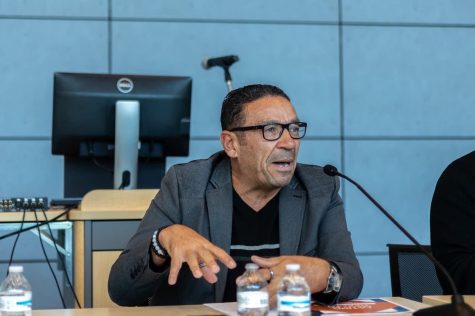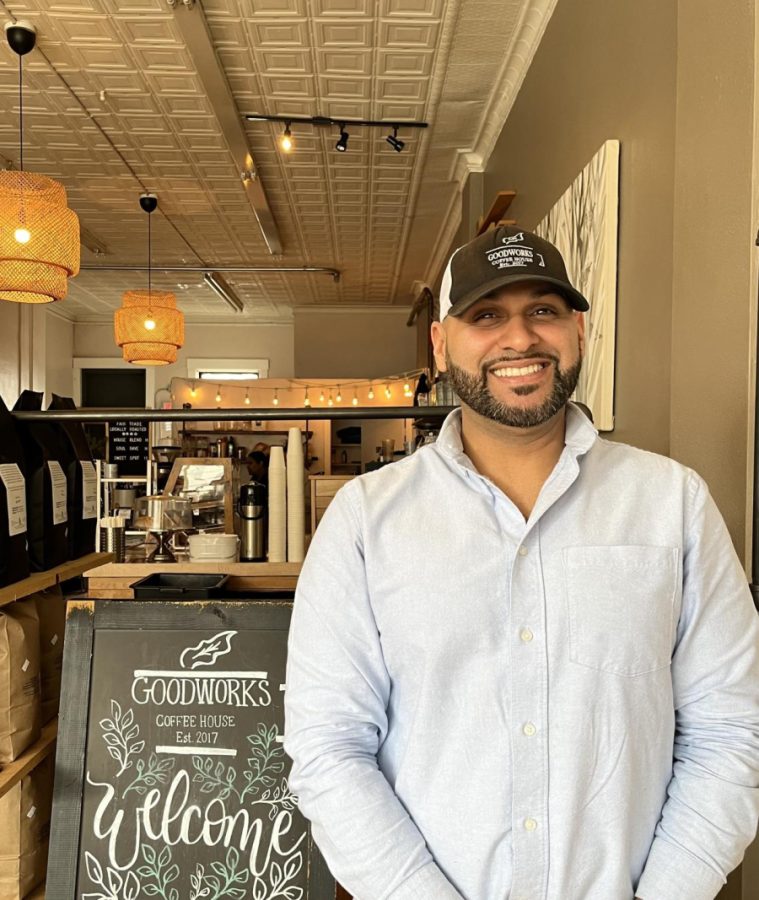Returning the Favor Back to the Streets of Springfield
June 9, 2023

Standing in front of the podium at the Stigma and Access Summit, Haner Hernandez faces the audience with conviction.
“I have earned a Ph.D., I’m a certified prevention specialist and I am certified and licensed as a drug and alcohol counselor,” says Hernandez.
“But I also have a GED and my GED I got in prison. And it was more difficult to get a GED in prison than to get a Ph.D. out in the real world.”
Born in Puerto Rico, Hernandez moved to Springfield in 1968 when he was a month shy of 5 years old. At that age, he was already acting as a translator for his single mother in the neighborhood of the North End.
Today his bilingualism has allowed him to be a speaker at multiple conferences such as the Stigma and Access Summit, which is a forum for people from all types of backgrounds to discuss stigma in the healthcare system and possible solutions. He as well has also been able to develop the LACE program.
LACE (Latino Addiction Counselor Education Program) is a course designed for Latinos by Latinos to become addiction counselors. The course is taught in both Spanish and English and focuses on addressing the disparities and barriers in the behavioral health field, such as language barriers.
For example, many people who speak solely Spanish are asked to call later in the day so they can be screened appropriately for acceptance when they attempt to reach out to detox and inpatient treatment facilities. This waiting period can at times take days.
“For someone ready for change,” says Sandra Munier, who is a trainer for the program, “this can be a matter of life or death. Additionally, multiple cultural factors oftentimes become a reason for someone to decide to leave a program before they complete treatment.”
When Hernandez moved to Springfield, it was a time of high racial tensions. Police Brutality was prominent at the time and the North End was a predominantly white community. There were only about three of four Puerto Rican families that lived in the area at the time.
“For us (Latinos), they never talked to us about college, they never talked to us about that. They called us spics and a whole bunch of other nasty names.”
During the year 1968 there was the civil rights movement. Multiple altercations took place in the area that Hernandez himself experienced firsthand.
There was a state of emergency declared by the governor and the mayor of Springfield at the time. A total of 400 officers were in riot gear in the North End and the national guard was mobilized. A curfew was put in place that restricted people of color from going out after 5 p.m.
“I remember when I could go out with my mom,” he says. “We couldn’t go into the parks because the parks were ruled by Whites,” he says.
After graduating middle school, Hernandez decided not to go to high school. Tracing back to the racism that he experienced in school, this is one of the factors that drove this. After being neglected in a system for so long one just begins to get fed up.
In Springfield at the time there was an emergence of gangs as well, and with these gangs comes exposure to violence and substances. At only the age of 11, Hernandez was arrested for the first time and was using drugs. From there he was in and out of juvenile detention until 17.
“I was in a downward spiral,” he says.
At the age of 17, Hernandez went to prison for the first time for drug dealing. This is around the time when Hernandez got his general equivalency high school degree, or GED.
When he was in prison there was something called “good time.”Good time is when inmates would be sent to programs such as ones for drugs and alcohol to get time off their sentence. However, despite his struggle with substance abuse, he didn’t want to take part in such programs. So the other alternative was GED classes.
“It was challenging because again, that was in prison. And when you’re in prison,” he says, “to say that you wanna do better and you wanna go to school is not a good thing. ‘Cause that’s not valued in prison.”
After getting his GED and his release, Hernandez ended up back in prison multiple times. On his last time, Hernandez was facing 12 charges related to gang activity and drugs. However, he heard, through an acquaintance, that he could request to be placed in a treatment program rather than being in jail.
Initially, the judge denied his request, but due to prison overcrowding, his request was granted. Through the program Hernandez grew a genuine want to never return back to jail. Over the course of a year in the program, however, Hernandez was going back and forth to court.
At a point within the year, Hernandez was facing up to 15 years in prison if he didn’t plead guilty and threw his mercy on the court. However, thanks to the support of the people from the program, family, his lawyer, and Sister Margaret Gibbons who was a social worker, the judge gave him a break, but under the condition that he couldn’t be arrested in any part of the world again unless he would serve the full sentence. Hernandez never went back
While in that treatment program, Hernandez was offered his first position in outreach work in the mid-80s which was involved in youth programs and peer education surrounding HIV.
“We developed the first peer education program in all of New England for young Latino people in the Boston area,” he says. “So I learned that I could just not do outreach, that I could develop programs.”
LACE when it first started offered 10 hours of training for counselors due to limited funds. Now, the program offers up to 300 hours. Other additions have also been added over the years, such as internships and mentoring. The program was opened initially in Boston, and later in Springfield as well with state permission.
“I said, ‘I wanna do it in Springfield because that’s where my family is,’” says Hernandez. “‘That’s where I did what I did on the streets and I wanna give back.”



